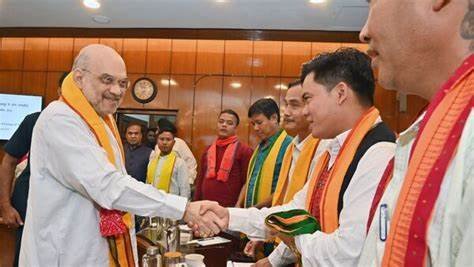The Dimasa National Liberation Army (DNLA), an insurgent group operating mostly in Assam’s Dima Hasao district, signed a peace agreement with the Indian government on Thursday in the presence of Union Home Minister Amit Shah and Chief Minister Himanta Biswa Sarma.
The signing of the memorandum of understanding (MoU) was a significant moment in the history of the region, as it marked the end of a long-standing conflict between the DNLA and the Indian government. The home minister announced that Assam no longer has any tribal terrorist group, as all tribal groups have now joined the mainstream.
Under the terms of the MoU, the DNLA will lay down its arms and abide by the Constitution. A total of 179 DNLA cadres will surrender their arms and ammunition. In exchange, the central and state governments will provide ₹500 crore each for the development of the Dimasa tribal areas.
This peace deal comes after the DNLA declared a unilateral ceasefire in September 2021 following an appeal by the chief minister. The ceasefire has been extended since then, leading to the peace agreement.
The DNLA was established in April 2019 with the goal of seeking a sovereign territory for the Dimasa tribals and launched an armed insurgency to achieve it. The group had been involved in several violent incidents in the region, including an alleged firing on a convoy of seven trucks in the Dima Hasao district that killed five people and injured one.
The signing of the peace agreement is a significant step towards bringing peace and stability to the region. The government’s efforts to negotiate with the DNLA and bring them to the mainstream have been widely praised.
The home minister expressed his appreciation for the DNLA’s decision to join the mainstream and called for other insurgent groups to follow their example. The chief minister also welcomed the peace agreement and said it was a new beginning for the people of the region.
The government’s commitment to providing funds for the development of the Dimasa tribal areas is an important step towards ensuring that the region experiences progress and development after years of conflict.

